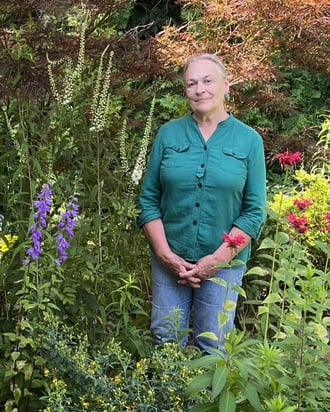 Finding Peace After Alzheimer’s Through Nature, Art, and Action"
class="bg-img"
fetchpriority="high"
loading="eager"
decoding="async">
Finding Peace After Alzheimer’s Through Nature, Art, and Action"
class="bg-img"
fetchpriority="high"
loading="eager"
decoding="async">

Renee Finlay has loved art all her life. She spent her entire career as an art teacher at Bellingham High School in Massachusetts - teaching painting, drawing, ceramics, crafting, and art history to teenagers for 37 years. Some were very interested in art. Most weren’t. But Renee says that surprisingly, her passion turned out to be connecting with those who initially wanted nothing to do with the subject. Since being diagnosed with early Alzheimer’s, Renee has taken on a similar affinity for others who, like her, are facing a future of living with the disease.
Renee wasn’t surprised when she received her diagnosis. Her mother developed Alzheimer’s Disease (AD) while still relatively young and eventually succumbed to it. All her aunts and uncle on her mother’s side developed the disease as well.
“The first thing that was apparent to me in dealing with my mom [and her Alzheimer’s disease] is that there is a stigma when dealing with AD. She told us, ‘Don’t tell anyone I have this, because I’m embarrassed.’ And that stuck with me,” Renee says.
She also recalls how disappointed she felt at the reactions of those with whom she did share the news.
“I needed to tell my boss and some coworkers because I needed to take some time off work to care for my mom. And I will never forget their reactions. They said, ‘Oh, it’s old-timers’ and sort of laughed it off. They didn’t realize that AD is not normal or natural, which startled me,” she says.
Now that she’s facing the same diagnosis, Renee wants others to understand that Alzheimer’s is not a normal part of aging, but a disease that requires more study and treatment. But, like her students who wanted nothing to do with art, she also advises those who are newly diagnosed not to turn away from the news or be afraid. Instead, she says, embrace every moment, stay active, and discover the peace of mind that can come with joining the fight against the disease.
“I didn’t want it to control my whole life, so I try to keep busy,” says Renee. “I’m in my garden, I’m down in my studio, I’m cooking. I’m trying to be busy and stay active, not just wallowing in my sorrow. I find I especially need to be outside. I’m really an outdoors kind of person and I think that’s my treatment - to be out in nature. That, and focus on my sons and grandchildren and try to live a full day every day and not waste it. I want to rejoice in what has been good in my life and in what is still here for me to recognize and interact with.”
Renee is still living a very full life, indeed. In addition to spending time with her husband of 50 years, her two sons, and three grandchildren, she serves on the Smithfield Conservation Commission and is a member of the Rhode Island Watercolor Society. She also serves on a committee at the Society, helping to put other artists’ work on exhibit each month. She has had her artwork displayed there too, as well as at the Smithfield Public Library.
Her work reflects her lifelong love for the outdoors and her connection with nature – a connection that she says has helped calm her mind and spirit since receiving her Alzheimer’s diagnosis.
“If you walked into my house, you would see a majority of landscapes and local scenes. Places in the woods, near the ocean, and lakes and streams. I think my spirit comes out in my landscapes,” she says. “Part of who I am is very much enriched by the forest, and water seems to be a constant theme that runs through my work as well. I was outside a lot as a child, in the forest and fields. I really relate to nature and so most of my pictures show that.”
Renee says she also finds peace and satisfaction in participating in research at the Memory and Aging Program (MAP). She already had experience with the program through her mother’s diagnosis. When she felt that something may not be quite right with her own memory, she returned to the program to be tested.
“Cheryl, who I see when I go in for my appointments, saw my uncle and knows my aunt very well, too. So, it was serendipity when she turned out to be the first person I talked to at my first appointment. It was an awesome kind of thing, and I said to myself, ‘OK Ma, I know what you’re doing,’” Renee says.
Renee is participating in the ENVISION study, which is seeking to verify the clinical benefit of the drug “aducanumab” and its effect on clinical decline compared with a placebo in participants with AD.
Ironically, Renee has a familial connection with the drug being studied as well. Her niece is working at the pharmaceutical company Biogen, as part of the team that developed aducanumab – a role she specifically sought out due to the family’s history of AD.
Renee comes in for appointments at MAP about every six weeks for the study, to have PET imaging scans, and to receive an infusion of either aducanumab or a placebo (no one in the double-blind study knows which).
“There’s one word that would describe it all and that is stressless,” Renee says. “I look forward to it. I think it’s wonderful that the team is there doing this work. I do it for my mom and her siblings, and for my kids and grandkids too. That’s where my focus is – what I can do for them. Being in this study is my contribution; this is what I can do to help my family and others.”
To learn more about our research and the Memory and Aging Program, visit www.butler.org/memory
Disclaimer: The content in this blog is for informational and educational purposes only and should not serve as medical advice, consultation, or diagnosis. If you have a medical concern, please consult your healthcare provider or seek immediate medical treatment.
Copyright © 2026 Care New England Health System